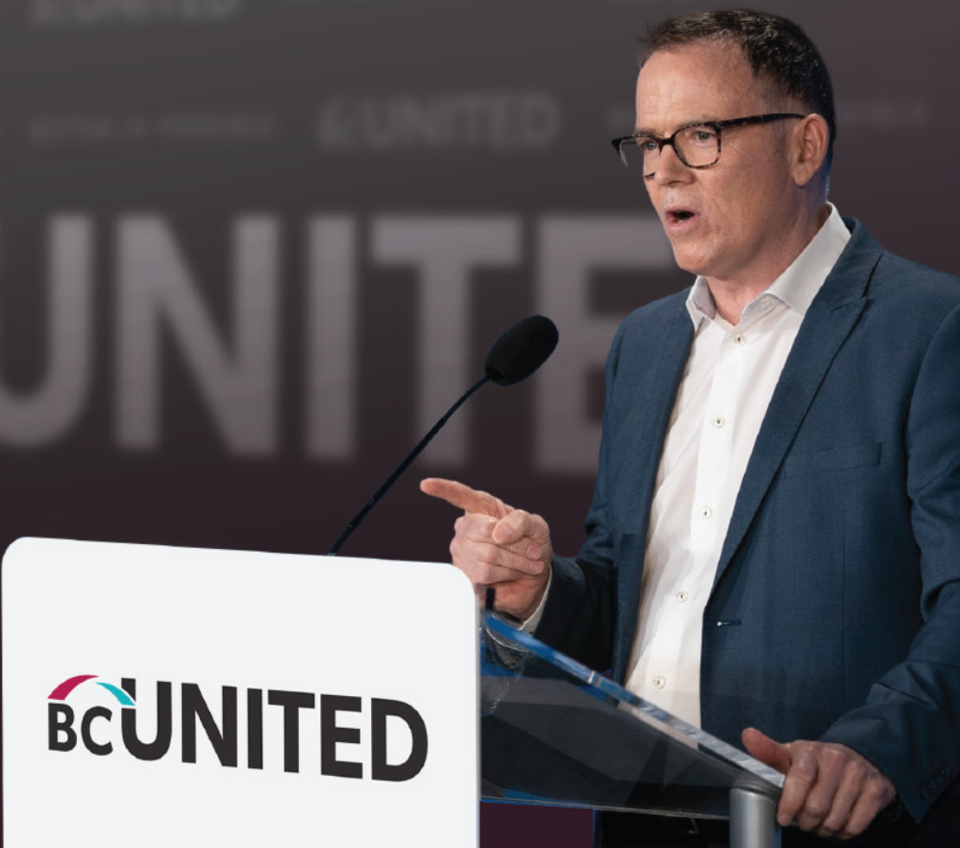The NDP government’s recent flip-flop over a provincial ban on public drug use has played out in predictable fashion: Weeks spent dismissing calls for action by the Opposition BC United party, a weak counterattack to portray criticism as irresponsible fear-mongering, and then, reluctantly, the realization that it was in fact New Democrats who’d staked out the wrong position after all.
The pattern has solidified on a variety of topics the past few months. And while repeatedly forcing the government to retreat and reverse might seem like good news for BC United, the party has so far failed to see any notable increase in voter support, according to recent polls.
“I don’t spend a lot of time worrying about polls, because I think, frankly, they are largely inaccurate,” BC United leader Kevin Falcon said in an interview.
“I’ve always said I give the public a lot more credit than many do. They are busy, not paying a lot of attention to politics. They may not notice the first time we get them to back down on, say, a billion-dollar museum vanity project, but eventually it starts to seep in.”
Falcon has yet to make up ground on Premier David Eby in terms of popularity or voter intent, according to surveys by Angus Reid and Research Co. in recent weeks.
That’s despite his party being out front on major issues that forced the NDP to change course, including: Autism funding, a climate action tax credit for affordability, directives to prosecutors on prolific offenders, business support to help deal with vandalism, the Royal BC Museum replacement, the closure of the museum’s Old Town, a $1 billion mental health and addictions plan, a province-wide ban on public drug use, and more.
“It’s a slow connecting of the dots, I call it,” said Falcon. “It won’t happen overnight. And it’s not like people are going to stand up and applaud the opposition for getting (government) to do the sensible thing.
“But I think over time people are starting to realize this is a government that is spending most of its time dealing with the problems created by its own mismanagement, and an opposition talking about a better way.”
There’s a lot riding on that hypothesis for Falcon. At some point, in the months ahead, he’ll need to show some tangible increase in popularity related to his policy victories, or the grumblings about his strategy and leadership will begin.
Helping the opposition’s cause, though, is the immense amounts of partisan bathwater being drunk in what has become a bloated and arrogant New Democrat administration.
Senior New Democrats seem to hate Falcon with an oddly-disproportionate passion, and they refuse to see when he and his opposition MLAs might be right about an issue. Hyper-partisan blindness is this government’s Achilles heel.
Inevitably, when Falcon brings forward actual, legitimate concerns of mayors, business people and residents — as he has repeatedly in the past few months — the Eby administration loudly proclaims that it will take no lessons on anything from a party that it defeated to form government.
Then, weeks, if not months, go by. The situation gets worse. Public frustration builds. The issue blows up. And a surprised government is forced to scramble.
The NDP doesn’t seem to realize it has lost its grasp of the public mood. It may not be reflected in the polls, but in the day-to-day coverage of B.C. politics you can sense it — a government caught off-guard on emerging issues like street disorder and open drug use, when it shouldn’t be.
Whatever apparatus the Eby government is using to gauge public sentiment is failing. The NDP spends most of its time digging up irrelevant facts about decades-old BC Liberal budget cutbacks as talking points, while the issues of the present day sideswipe them.
“It is partly a thing that can happen over time in government where they start to think they are really important, and the people they are listening to are a very small circle of political advisors that all drink from the same bathwater, and a bureaucracy that is there to serve but without clear direction will be idle and not work with particular urgency,” said Falcon.
“Whereas I’m spending a lot of my time out meeting with regular folks.”
Falcon said he’s changing his political strategy because of this realization. What had been a plan to roll out significant policy planks before the election has been altered to prevent the NDP from stealing ideas, like the government attempted to do with BC United’s $1 billion addictions treatment plan.
It’s a risky proposition for an opposition leader still trying to show tangible political momentum, after a series of policy victories. But it is perhaps no more risky than a government running blind out of partisan spite, and stubbornly refusing to recognize that it has lost touch of public sentiment.
Rob Shaw has spent more than 15 years covering B.C. politics, now reporting for CHEK News and writing for Glacier Media. He is the co-author of the national bestselling book A Matter of Confidence, host of the weekly podcast Political Capital, and a regular guest on CBC Radio. [email protected]




